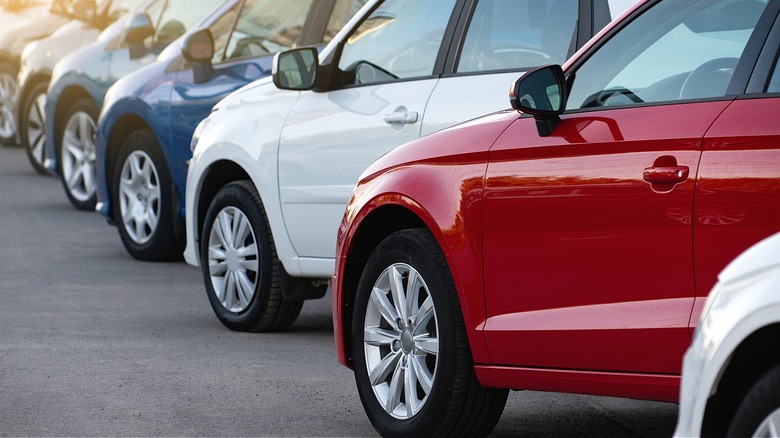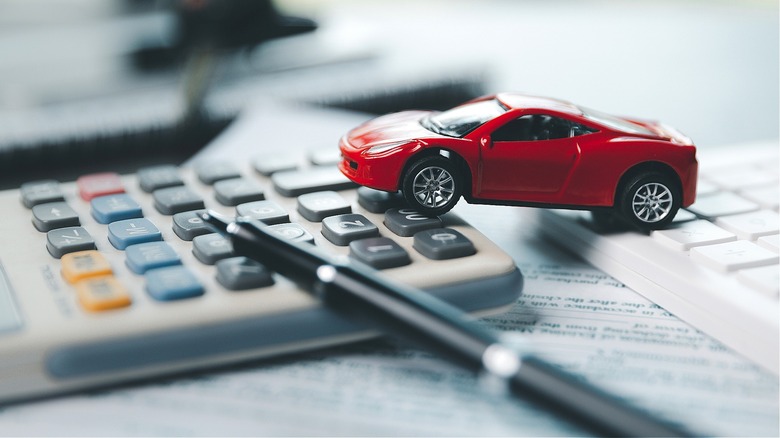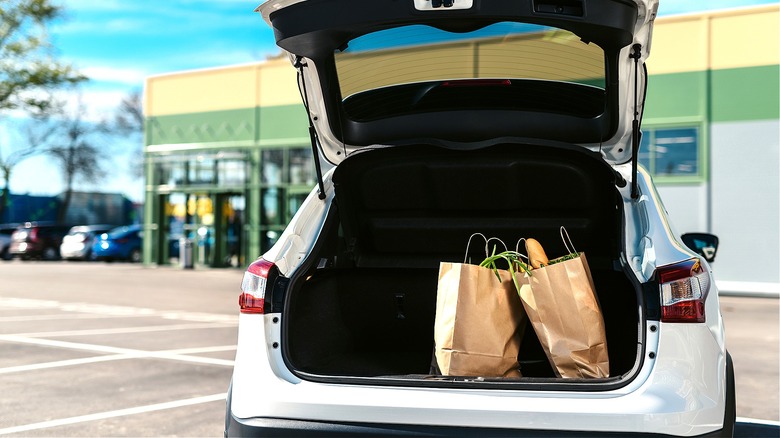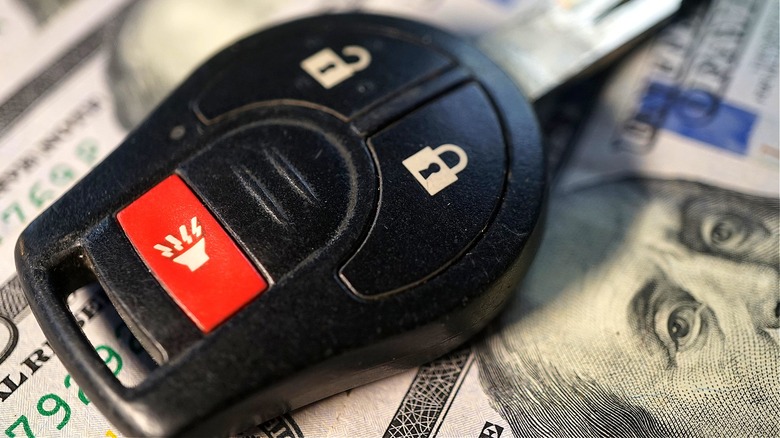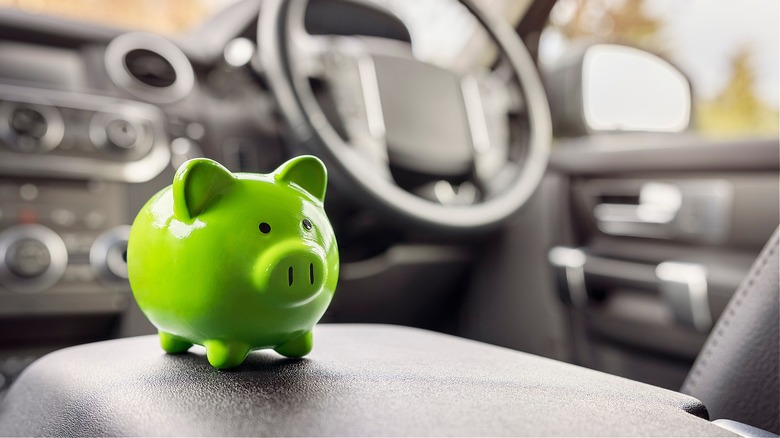Think Twice Before Buying A Brand New Car. Here's Why
According to AAA's Your Driving Costs annual report, the cost of owning a new vehicle in 2023 averaged $12,182 a year, which comes to $1,015 every month. From this number, it's clear to see why car ownership is the second-biggest expenditure in America after housing (per BLS). What's more, AAA reports the cost of buying a new car went up by 4.7% in 2023. Based on its study, the overall average manufacturer's suggested retail price (MSRP, or sticker price) for a new car in 2023 was $34,876 — $1,575 more than in 2022. So suffice to say, when it comes to buying a brand-new car, the initial cost is, of course, a major consideration, but there are other factors to consider, too.
If you're considering buying a new car, it's definitely not a decision to take lightly, as the big-ticket purchase is one for the long term. From initial price to depreciation to the practicality of a car in your life, there are a number of things to ask yourself before signing on the dotted line.
The sticker price
When buying a car, consumers have two basic choices: new or used. While this choice was a bit more clear-cut in the past — before the pandemic production slowdown and global chip shortage — it's even more of a choice today, with the price of used cars going up dramatically in recent years, as the inventory in the pre-owned car market dropped as well. According to Kelley Blue Book, it cost 35% more to buy a used car in 2023 than in the years before the pandemic era. That said, buying a brand-new car during this time also rocketed — with consumers paying above sticker price for 20 consecutive months before March 2023 (per KBB).
This said, in general, buying a new car will always be more expensive than buying a used one. Per Forbes, over the past five years, the average cost to buy a new car was $39,884, while the cost to buy a used car during that same period was $24,242, or about 39% more. Further, to highlight how prices have jumped to begin the 2020s, the average cost to buy a brand-new car in 2022, per Forbes' data, was 12.6% higher than the five-year average.
And, of course, the cost of financing a car needs to be factored in as well. Most consumers can't afford to pay for a new car with cash, so you need to consider how much you can pay each month toward a car loan. Per Experian, 79.09% of new cars bought in 2023 were financed.
How will you use the car?
According to Forbes' 2023 assessment on car ownership in America, nine out of 10 people in 2021 owned at least one vehicle, with over 20% of households owning three or more cars. Plus, as noted, per the Bureau of Labor Statistics, Americans spend a lot on transportation, second only to housing. So, with that said, when buying a car, one question you should ask yourself is "why" you need a car. How will you use it? This question won't only help you decide if you need a new car, but also what kind of vehicle would be best for you — i.e., compact or family-sized, a sedan or a truck, luxury or economy.
If you plan to use your vehicle primarily to run errands around town, is a brand-new car absolutely necessary? Or is buying a used car a more financially sound way to go. Do you need a reliable car to make the daily commute to and from work? If so, then perhaps a brand-new car makes sense. Even so, do you need a $40,000 ride for the drive? If you can purchase a brand-new vehicle without a lot of the bells and whistles, that would bring the sticker price down. Further, if you live in a state like California, buying a new car also brings with it the question of gas versus electric.
Monthly costs
With new-car prices averaging $35,000, it's not a surprise that most U.S. consumers can't afford to pay for a brand-new car with cash. Per its State of the Automotive Finance Market report for Q3 of 2023, Experian says that of consumers buying a new car, 79.09% of them financed their purchase. Further, per the study, the average amount financed for a new vehicle in 2023 was $40,184, with an average monthly payment of $726, a 3.4% increase over 2022 and a whopping 15% increase from 2021.
So, if you're thinking of buying a new car, the obvious budget question to ask is whether or not you can afford paying for it every month, which will not only include a potential $700+ car payment, but also require money for fuel, repairs and maintenance, and insurance premiums. Let us remember that AAA says the average monthly cost of owning and operating a new vehicle in 2023 was $1,015 — which is nearly 12% higher than in 2022.
A car's depreciation over time
We haven't yet touched on depreciation, but as probably everyone knows, new cars lose value once they drive off the lot. According to Experian, not all cars depreciate at the same rate, but as a general rule, cars depreciate 20% in their first year and then 10% every year thereafter for the next five years. Per Experian, cars depreciate yearly for their first 10 years. So, if you buy a brand-new car, know that you'll likely be driving a car worth 80% less within a year's time. Meanwhile, you'll just be starting the second year of your car loan.
Kelley Blue Book advises that one way to beat depreciation is to basically buy a new used car, i.e., one from the current year or previous year. This way, you won't pay the price of a new car (you'll get the 20% discount, essentially), and the car will be in practically new condition. What's more, if you want to keep the resale value of your car, just make sure to keep it in the best condition possible. It will not only help you with a trade-in or resale in the future, but it'll also stave off costly repairs in the present.
A few alternatives
If after reading this, you're thinking a car is one of the things you should never buy brand new, we understand. Especially when you factor in the initial and long-term costs of buying a new car, as well as the alternatives that are out there, such as buying a new used car that can immediately save you money.
Another option to buying that's been around for decades is to lease a new car. While leasing it no longer at its peak, Experian found that 21.29% of new vehicles in 2023 were leased, up from 18.06% in 2022. Yet another way to go, though, is to purchase a certified pre-owned (CPO) vehicle. As with buying a new used car, a CPO car has already depreciated, and its price will reflect that. Typically, these cars are at most 5 years old and have mileage below a certain threshold (e.g., 60,000 or 75,000 miles). Most importantly, however, is that CPO vehicles undergo a manufacturer-backed, multipoint inspection that ensures the car is in excellent condition. Per Edmunds, the manufacturer warranty usually adds one or two more years of coverage.
Finally, another alternative to buying a new car? Buying a used car in good condition, and then renting a newer car — the exact model you would buy if you could, with all the cool new features you'd like — for special occasions or outings.
